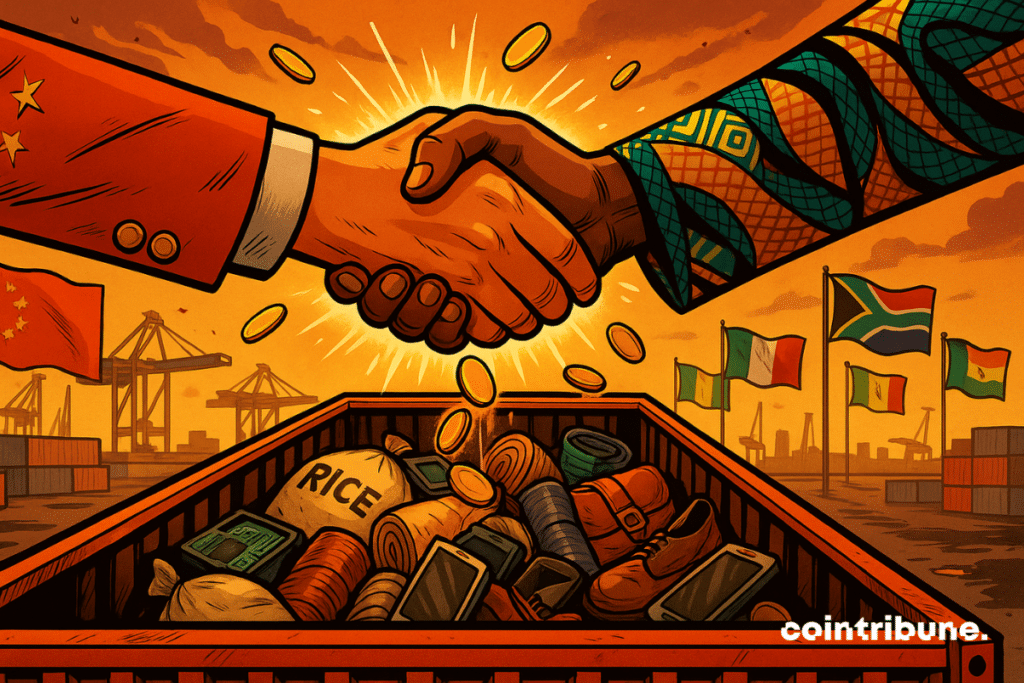14h05 ▪
5
min read ▪ by
Amidst the turmoil of global commercial rearrangements, Beijing is advancing its pieces. China announces the total removal of tariffs on exports from 53 African countries, expanding preferential access to its market. Behind this gesture lies a targeted diplomatic offensive as Washington, under Donald Trump, reactivates protectionist measures against the continent. Africa, long peripheral in geo-economic decisions, becomes the epicenter of a clash of influences where industrial ambitions, strategic alliances, and sovereignty narratives intersect.

In Brief
China announces the removal of all tariffs on exports from 53 African countries.
This decision expands a previous agreement, initially reserved for the least developed African countries.
Major economies such as Nigeria and South Africa are now included in the scheme.
The announcement comes amid trade tensions, with the United States threatening heavy tariffs on several African countries.
Beijing Lifts Barriers: A Historic Shift in Sino-African Relations
After the global shock caused by Trump’s tariffs, China officially announced at the ministerial coordination meeting of the Forum on China-Africa Cooperation (FOCAC) its intention to remove all tariffs on imports from the 53 African countries with which it maintains diplomatic relations.
This decision represents a significant expansion of a previous agreement made in 2024, which concerned only African countries classified as “the least developed”. The new measure will now include major trading partners on the continent such as Nigeria and South Africa, who were previously excluded from these tariff benefits.
In a joint statement, the ministers condemned the policies of certain states aiming to “disrupt the global economic and trade order” through “the unilateral imposition of tariffs”. Although Beijing did not specify the effective date of this decision, its announcement already has significant impact on the geo-economic stage.
Several key elements emerge from this announcement, illustrating its scope and immediate implications for the African continent:
Africa exports to China about 170 billion dollars annually, mainly raw materials such as copper, cobalt, and bauxite;
This decision will now include intermediate economies not covered by the 2024 agreement, such as Nigeria, South Africa, and Ghana;
Eswatini remains excluded due to its diplomatic recognition of Taiwan, which China considers a secessionist province;
This announcement comes as the United States, under Donald Trump, threatens to drastically increase tariffs on African exports: 50% for Lesotho, 30% for South Africa, 14% for Nigeria;
The United States has temporarily suspended the application of these tariff increases, but uncertainty remains palpable for African exporters.
In this context, China presents itself as an alternative partner, offering tariff-free market access and increasingly playing a central role in the global South’s trade architecture.
A Disguised Economic Influence Strategy?
Beyond the tariff removal itself, the timeline and geopolitical context highlight China’s intent, as an important member of the BRICS alliance, to reconfigure the balance of international economic relations, particularly vis-à-vis the United States.
China and its African partners call on the United States to resolve their trade disputes in a spirit of “respect and mutual benefits”. At the same time, this tariff opening allows China to strengthen economic ties with resource-producing countries such as the DRC and Guinea, while sending a clear signal to the rest of the world.
Within this framework, the initiative could encourage increased use of the yuan in Sino-African bilateral settlements, notably in digital form. The development of the digital yuan, already piloted in several regions in China, could find fertile ground on the African continent, where traditional financial infrastructures are often lacking, but the adoption of mobile money is strong.
By extension, some economists are questioning the potential emergence of stablecoins backed by African resources, a still marginal but closely watched topic in crypto and fintech circles.
Beyond immediate benefits for African economies, this Chinese strategy could redraw global trade circuits in favor of a more integrated commercial bloc between China and its African partners, to the detriment of the West, despite the 90-day suspension of tariffs. While this dynamic opens new prospects for the continent, it raises concerns about possible long-term commercial and technological dependence. For Africa, the challenge will now be to leverage this opening without succumbing to risks of structural asymmetry.
Maximize your Cointribune experience with our “Read to Earn” program! For every article you read, earn points and access exclusive rewards. Sign up now and start earning benefits.
Diplômé de Sciences Po Toulouse et titulaire d’une certification consultant blockchain délivrée par Alyra, j’ai rejoint l’aventure Cointribune en 2019.
Convaincu du potentiel de la blockchain pour transformer de nombreux secteurs de l’économie, j’ai pris l’engagement de sensibiliser et d’informer le grand public sur cet écosystème en constante évolution. Mon objectif est de permettre à chacun de mieux comprendre la blockchain et de saisir les opportunités qu’elle offre. Je m’efforce chaque jour de fournir une analyse objective de l’actualité, de décrypter les tendances du marché, de relayer les dernières innovations technologiques et de mettre en perspective les enjeux économiques et sociétaux de cette révolution en marche.
DISCLAIMER
The views, thoughts, and opinions expressed in this article belong solely to the author, and should not be taken as investment advice. Do your own research before taking any investment decisions.




